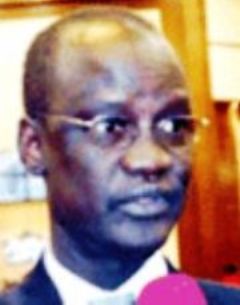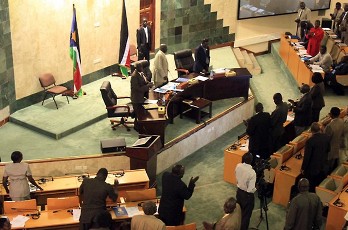S. Sudan MPs reject Telar’s appointment as justice minister
August 13, 2013 (JUBA) – Telar Ring Deng’s bid to become South Sudan’s next justice minister suffered a major blow on Tuesday after the majority of the country’s lawmakers rejected his appointment.

The vote brings to an end weeks of controversy and speculation over Deng’s bid to hold what is regarded as one of the country’s key ministries.
Members of the house exchanged conflicting views on Deng’s appointment prior to the secret ballot, with journalists forced to leave the fully-packed national assembly before the voting took place.
The ballot followed a two-week-long parliamentary vetting process, during which all newly-appointed cabinet ministers – with the exception of Deng – were approved.
Announcing the outcome of the vote, speaker of the house James Wani Igga urged members not hold personal grudges, adding that the assembly acted on the basis of the democratic principles of the majority.
“Let some of you not take parliamentary matters as personal matters. Parliamentary affairs are purely issues of the house and they remain here. We should know that we are in a democratic country where decision of the majority is respected”, Igga told legislators.
The decision drew overwhelming public support, amid praise the house had acted as a proper representative body.
The new cabinet was appointed following the 11 August decision by president Salva Kiir to dissolve the entire government and remove his long-standing deputy Riek Machar.
All national ministers and their deputies were vetted before being granted final approval, with thorough background checks of individual nominees conducted by the 11-member select committee.
Several key ministers, including the defence, interior, finance and foreign affairs portfolios, were last week vetted and received unanimous approval.
However, the house failed to include Deng’s name and the deputy information minister on account that it was still seeking more information to complete background checks.
Lawmakers said they had been investigating a number of discrepancies contained in Deng’s Curriculum Vitae. Deng, who acted as a judge during the north-south civil war in areas liberated by the South Sudan army (SPLA), claimed to have a law degree, but academic transcripts and other relevant information could not be verified.
Prior to the vote, some MPs argued that Kiir’s decision to authorise ministerial post holders to single-handedly approve large public funds without involving the relevant institutions was unconstitutional.
Kiir later wrote to the committee saying he had authorised Deng to approve $600 million on behalf of the government to acquire land meant for the national security service after the issue proved a stumbling block to his approval.
PUBLIC SUPPORT
A survey conducted by Sudan Tribune on Tuesday showed the majority of citizens approved the decision, although some questioned the impartiality of the committee and whether it was truly free from political influence.
Banguot Amum, a member of parliament representing Jonglei state’s Pibor county, also welcomed the decision, saying he vote reflected the views of the public.
“When people are happy we also become happy because we are their representatives. We do not represent ourselves. There are people we represent. We are therefore representatives of the people and must listen to them. You can now see from the faces of the people around. They are all happy, hugging each other and congratulating members of the house. This is a sign that shows the public is happy with the result of the vote”, Amum told reporters.
Deng Chol, a native of Abyei, said decision sent a clear message to the governing leadership and the general public that it had assumed its rightful role as “public watchdog”.
“I am very happy and I would want the media to share this happiness with the members of the general [parliament]. The decision of the house might be seen as [an] embarrassment to the leadership but it is the right decision. We need people with high integrity, people who are honest, frank and straightforward”, Chol told Sudan Tribune at the office of the minister of information and broadcasting service on Tuesday.
Sebit Abdu, a native of Western Equatoria state, said he was surprised that the house -predominantly members of the ruling Sudan People’s Liberation Movement (SPLM) – had unanimously voted against one of their own colleagues.
“Frankly speaking, I was not expecting that Mr Telar Deng would fail the voting in his favour because the house is dominated by members of his own SPLM, which is the ruling party. I thought it is probably still too early to expect this much from the house dominated by members of one party”, Abdu said.

“The parliament wants to send a signal that it is in control. It wants to restore public trust. They want to tell the general public they have decided to work for those who elected them so that they can come again next time because we are left with one year to go before elections in 2015. This is how I read the decision of the house”, he said.
“LOGICAL GROUNDS”
Jacob Deng, a member of the national legislative assembly, justified the decision by saying it was based on “logical grounds”.
“It is expected in every country of the world that [the] justice minister is the first legal advisor of the government. So the person appointed into office should at least a have bachelor of law and must have passed legal service bar exams, but appointing someone with a pre-law degree will be putting the paramedic as a surgeon at a hospital. How will this non surgeon carry out [the] operation”, the member said.
The legislator also denied that the vote had embarrassed the leadership, saying the decision was for the benefit of the people and the country at large.
“What is correct is that it is democracy at work. It is about who fits working in the public office. It is actually embarrassing for the leadership to allow someone with questionable qualifications to represent the party where there are thousands of willing and competent cadres to serve the country”, the lawmaker explained.
PETITION TO PARLIAMENT
The decision came after the family of the late Ustaz Mayek Riak Ater presented a petition to parliament calling on MPs to reject Deng’s nomination to the cabinet.
In the petition letter submitted by Mayek’s children, Deng is accused of wrongly sentencing the respected Lakes state teacher to death while serving as a judge during the north-south civil war and lying about his legal qualifications.
Mayek, who remains well-known for his contribution to education in South Sudan, joined the SPLA in 1985, where he served as second lieutenant.
He was court martialled and sentenced to death by Deng in about 1989. However, the circumstances of his death remain unclear, with varying accounts given of what transpired.
“Ustaz Mayek Riak was unfairly put through a sham process by a phoney lawyer and judge. He was sentenced to death by an individual who conned our leaders to believing that he was a lawyer. Telar Ring Deng never entered law school. It has now been confirmed”, the petition said.
“Telar Ring Deng has done so much damage to our country that, we, as the people of South Sudan cannot allow him to serve in any official position in the country”, it adds.
(ST)
Related article:
On the impartiality, objectivity and transparency of vetting committee
